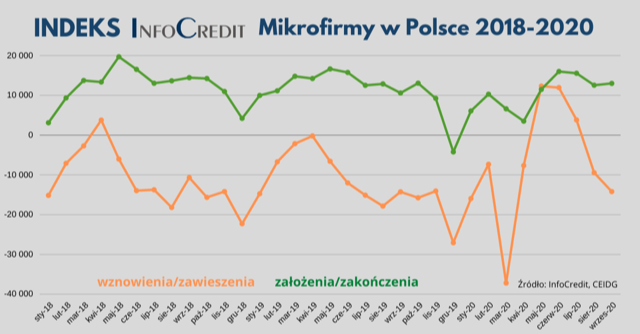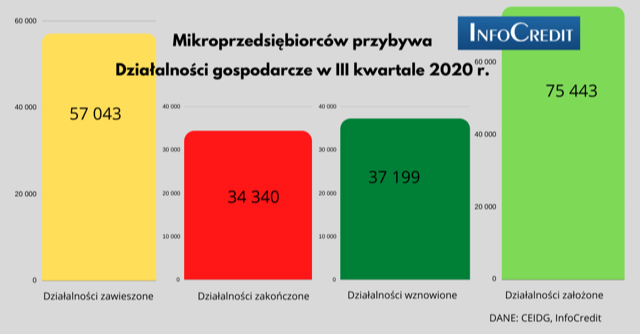September is once again a month of suspensions
InfoCredit Microenterprise Index
InfoCredit’s forecasts for September have been confirmed. The number of new businesses continues to grow, and the InfoCredit indicator describing the ratio of businesses being established to those being closed is again rising strongly. It is true that we have noted a significant predominance of suspended businesses over those being resumed, but this is a typical phenomenon at the end of August and September, when the holiday season ends. New burdens may increase the attractiveness of the simplest form of entrepreneurship.
In September, 26,797 new businesses were established, 13,796 were closed. 11,889 were resumed and 26,084 were suspended – according to preliminary CEIDG data.

The InfoCredit microenterprise index, describing the ratio of new businesses to those closed, rose from 12,550 points to 13,001 points. The indicator describing the ratio of businesses being resumed to those being closed fell from -9,461 points to -14,195 points.
As usual, most businesses were suspended in the last days of the month. In the last ten days of September, i.e. from 21 to 30 September, CEIDG received 15,550 such applications (as many as 11,508 in the last 3 days). This is a planned action that usually repeats itself at this time of year. We noted a similar phenomenon in the last 10 days of September 2018, when 14,277 were suspended, and in 2019, when 16,199 were suspended.
On the other hand, those starting new businesses still have a big advantage over those closing them. This means that this form of entrepreneurship is holding up very well. The number of micro-entrepreneurs is still record-breaking, taking into account the whole picture of the situation. In the entire third quarter of this year, 75,443 new businesses were created, 34,340 were closed. 37,199 businesses were resumed, and 57,043 were suspended.
The simplest form of business will still be popular
In the coming months, it will still be worth closely monitoring applications submitted to CEIDG. This is related not only to rising labor costs, a more difficult situation on the labor market and market flexibility. Changes in the forms of taxation of entrepreneurs may also have an impact on traffic in CEIDG.
– We are closely monitoring the plans to impose CIT on limited partnerships. Our databases show that this will affect almost 73 thousand entrepreneurs who are co-owners of approximately 43 thousand limited partnerships. Our calculations show that after the changes are introduced, as many as 25% of limited partnerships, which account for 90% of the revenue generated by these businesses (i.e. almost PLN 300 billion annually!) will pay 19% CIT. Effectively, the interest rate for partners in these companies, mainly Polish entrepreneurs, will increase to 34% or, in the case of people paying the solidarity tax, to 38% – says Jerzy Wonka, InfoCredit Development Director.
In his opinion, the introduction of double taxation for partners in limited partnerships may cause them to start analyzing other forms of conducting business, including economic activity. – The InfoCredit Index has been signaling for many months that when there are fewer positions, there are more sole proprietorships. And these have a much lower ability to achieve market success than limited partnerships, which already have an established position on the market – adds Jerzy Wonka.
How do we calculate the InfoCredit Index?
The InfoCredit indicator was created to track alternative forms of employment and self-employment at a time when the situation on the labor market is changing dynamically. The index, which is developed by the oldest company in Poland analyzing the economy, takes a positive value when there are more new businesses than closures. When there are fewer than closed ones – a negative value. In the same way, we track the ratio of resumed to suspended businesses.
